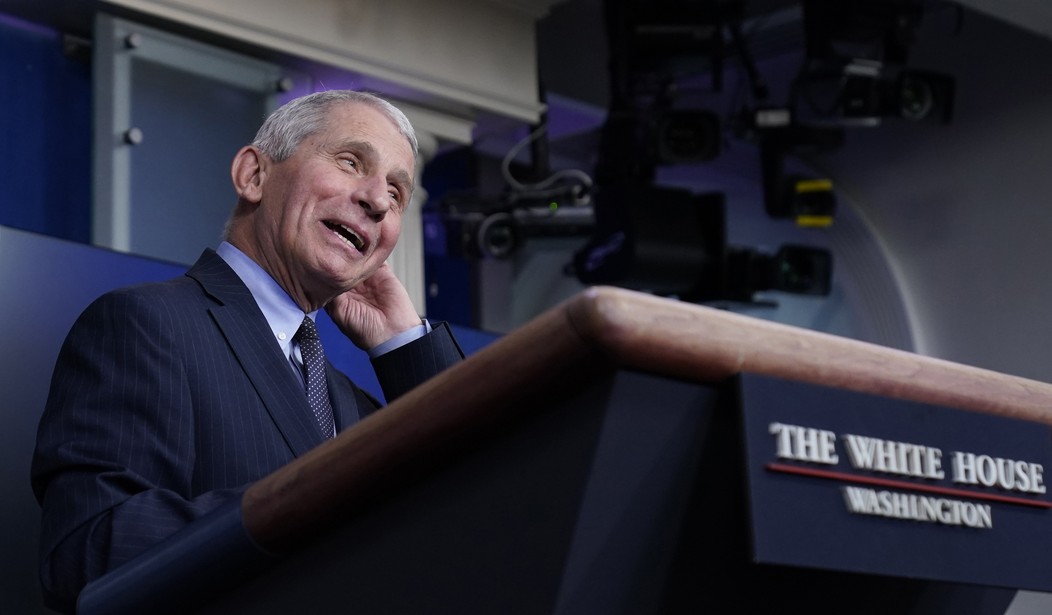We Americans sure do love us some experts. Utterly fixated on credentials, we believe degrees and titles confer, if not magical powers, then at least superior wisdom and intellectual capacity. We seem to forget that a credential is no guarantee of competence, much less understanding, as any business owner who has just hired a recent college graduate knows very well. We also, to our peril, ignore the fact that the experts are frequently wrong.
A greater problem, though, is that we all too often listen to the wrong experts. Yes, on balance, experts do know more about one specific subject than the rest of us and are therefore somewhat more likely (though hardly guaranteed) to be right when it comes to that specific subject. But there are experts and there are experts, and the ones with the biggest platform aren’t necessarily the ones with the most expertise.
In particular, in the age of technocracy, we have become enamored of government experts, assuming that because they work for the government — ostensibly, for the people — they must constitute the highest order of experts and have the least self-interest. Those assumptions are usually, tragically false.
Consider the health care technocracy, currently the driving force behind all our social policy. As a society, we have come to regard those government medical experts who regularly grace our TV screens as minor deities. They’re often described in glowingly hyperbolic terms, like “foremost experts” and “top doctors.” But are they really?
Do you know what government service pays? Better than most jobs, to be sure, but not as much as genuine “top doctors” can earn in private practice. Or at an elite university, where medical school professors and researchers can literally make millions. Given that reality, why would the best doctors in the country work for the government?
Also, let’s not lose sight of the fact that technocrats, for all their supposed technological expertise, are, first and foremost, bureaucrats (hence the term). And in a very real sense, bureaucrats aren’t really people—not when they speak as bureaucrats on behalf of the bureaucracy. Then they’re just members of the hive channeling the hive mind. And the hive’s first instinct is always self-preservation.
Recommended
You may think the primary purpose of a bureaucracy is noted on the sign above the door: The school system exists to educate students, the DMV to issue drivers’ licenses, the CDC to control diseases, etc. Not so. The first goal of any bureaucracy is “to transmit itself unimpaired to posterity,” in Thoreau’s pithy phrase. And the first goal of any individual bureaucrat is to make sure they have a job in perpetuity. Educating students, issuing licenses, and protecting the public are important but secondary concerns for bureaucrats, including the technological kind
Another false assumption is that those who make it to the top of their respective bureaucracy must therefore be the very best at what they do. This ignores the nature of bureaucracies, where advancement is generally due more to political acumen than to subject-matter competence. Anyone who has ever worked in a bureaucracy, as I have, knows how people get promoted. Yes, sometimes they’re actually quite good at what they do, but in many cases what they’re really good at is sucking up, throwing co-workers under the bus, and not rocking the boat.
But perhaps the most important skill for burgeoning bureaucrats is fluency in doublespeak, a language carefully calibrated to say something without saying anything, thus avoiding liability and covering posteriors. That can be problematic when the people you rely on for information are bureaucrats.
Today’s bureaucrat-in-chief is Anthony Fauci, de facto spokesperson for the covid technocracy. By now, it should be painfully obvious to anyone with an ounce of objectivity that the good doctor, despite his degrees and telegenic, loveable nerd persona, has no idea what he’s talking about. As South Dakota Governor Kristi Noem (herself no slouch in the telegenic department) so succinctly put it, “Dr. Fauci is wrong a lot.”
But…but…but Fauci is a doctor, you say reverently. No, he used to be a doctor. Now he’s a just bureaucrat with a medical degree. And as such, he has become a master of doublespeak: You shouldn’t wear a mask, except that you must wear a mask, in fact you should probably wear two, although there’s no evidence that helps. Once everyone is vaccinated, things will all get back to normal, but unfortunately no one can go back to normal after being vaccinated. And so on.
Here’s a classic example from last summer: When asked byThe Chronicle of Higher Educationif colleges should prepare for “people getting sick and dying on…campuses this fall,” Fauci replied: “That is extremely unlikely, but there are always outliers that are not the rule but the exception. From what we’ve seen and our experience thus far with this disease, it is very unlikely that a young, healthy college student is going to get into serious trouble to the point of requiring intensive care and dying. But we’ve seen that. It has happened. It happens rarely, but it happens.”
See what he did there? He gave his answer in the first four words. The rest was standard bureaucratic doublespeak—essentially, butt-covering. (For the record, it didn’t happen.)
So what are we supposed to do when the technocrats in charge traffic almost exclusively in such gobbledygook? Maybe it’s time we fall back on that old standby of free, intelligent, responsible adults and start doing our research and making up our own minds.
Nah, that’ll never work. Unless it does. But it might not. Then again, it just might.
























Join the conversation as a VIP Member